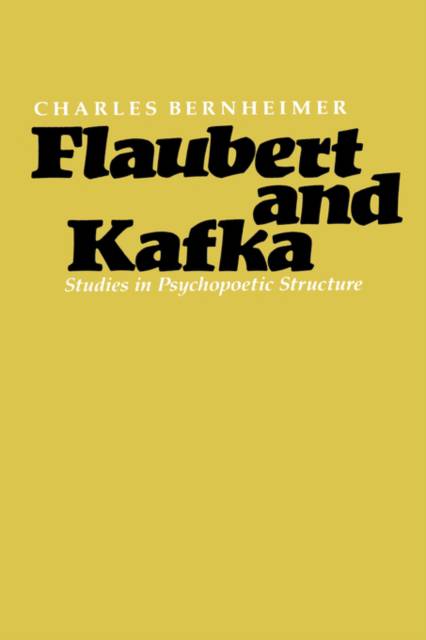
Door een staking bij bpost kan je online bestelling op dit moment iets langer onderweg zijn dan voorzien. Dringend iets nodig? Onze winkels ontvangen jou met open armen!
- Afhalen na 1 uur in een winkel met voorraad
- Gratis thuislevering in België vanaf € 30
- Ruim aanbod met 7 miljoen producten
Door een staking bij bpost kan je online bestelling op dit moment iets langer onderweg zijn dan voorzien. Dringend iets nodig? Onze winkels ontvangen jou met open armen!
- Afhalen na 1 uur in een winkel met voorraad
- Gratis thuislevering in België vanaf € 30
- Ruim aanbod met 7 miljoen producten
Zoeken
Omschrijving
Although their styles appear remarkably different, Flaubert and Kafka share a common identification with the writing process itself. "I am a human pen," wrote Flaubert; "I am nothing but literature," declared Kafka. This stimulating book is the first to explore the link between these writers.
Introducing his conception of psychopoetics, Charles Bernheimer brings new clarity to many controversial issues in psychoanalysis, rhetoric, and critical theory. In chapters on Flaubert and Kafka he probes the desires and fears motivating each writer's search for a fully satisfying literary style. His interpretation of the strategies the authors adopt to harness the negativity of writing reveals the creative function of such psychological phenomena as narcissism, fetishism, and sadomasochism. The major works, Bernheimer argues, dramatize the conflict between the structures of Eros and Thanatos, metonymy and metaphor, through which they are constituted. From this illuminating perspective he traces the genesis of each writer's mature style, analyzes two early works, La Tentation de saint Antoine and "The Judgment," and examines two late masterpieces, Bouvard et Pécuchet and The Castle, applying to the latter Walter Benjamin's description of the allegorical mode.
This highly original work of theoretical criticism will interest not only readers of Flaubert and Kafka but all students of literary theory and the creative process.
Introducing his conception of psychopoetics, Charles Bernheimer brings new clarity to many controversial issues in psychoanalysis, rhetoric, and critical theory. In chapters on Flaubert and Kafka he probes the desires and fears motivating each writer's search for a fully satisfying literary style. His interpretation of the strategies the authors adopt to harness the negativity of writing reveals the creative function of such psychological phenomena as narcissism, fetishism, and sadomasochism. The major works, Bernheimer argues, dramatize the conflict between the structures of Eros and Thanatos, metonymy and metaphor, through which they are constituted. From this illuminating perspective he traces the genesis of each writer's mature style, analyzes two early works, La Tentation de saint Antoine and "The Judgment," and examines two late masterpieces, Bouvard et Pécuchet and The Castle, applying to the latter Walter Benjamin's description of the allegorical mode.
This highly original work of theoretical criticism will interest not only readers of Flaubert and Kafka but all students of literary theory and the creative process.
Specificaties
Betrokkenen
- Auteur(s):
- Uitgeverij:
Inhoud
- Aantal bladzijden:
- 264
- Taal:
- Engels
- Reeks:
Eigenschappen
- Productcode (EAN):
- 9780300026337
- Verschijningsdatum:
- 10/09/1982
- Uitvoering:
- Hardcover
- Formaat:
- Genaaid
- Afmetingen:
- 165 mm x 243 mm
- Gewicht:
- 589 g

Alleen bij Standaard Boekhandel
+ 179 punten op je klantenkaart van Standaard Boekhandel
Beoordelingen
We publiceren alleen reviews die voldoen aan de voorwaarden voor reviews. Bekijk onze voorwaarden voor reviews.











